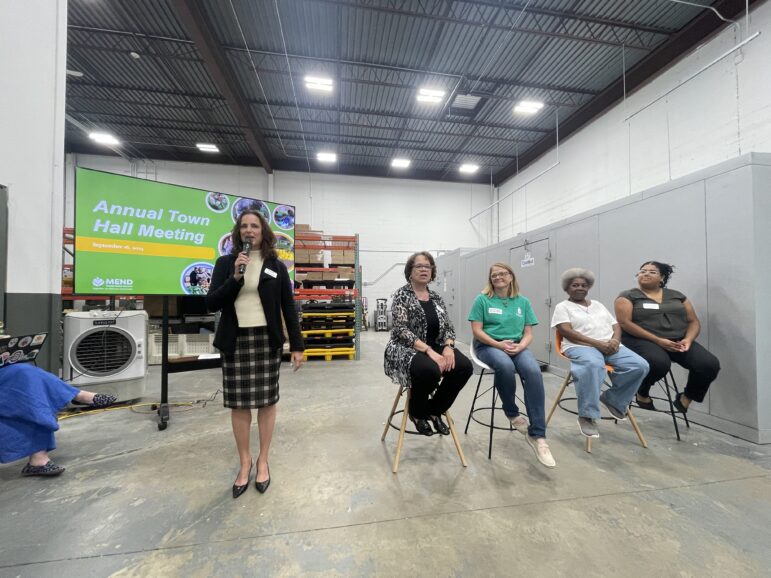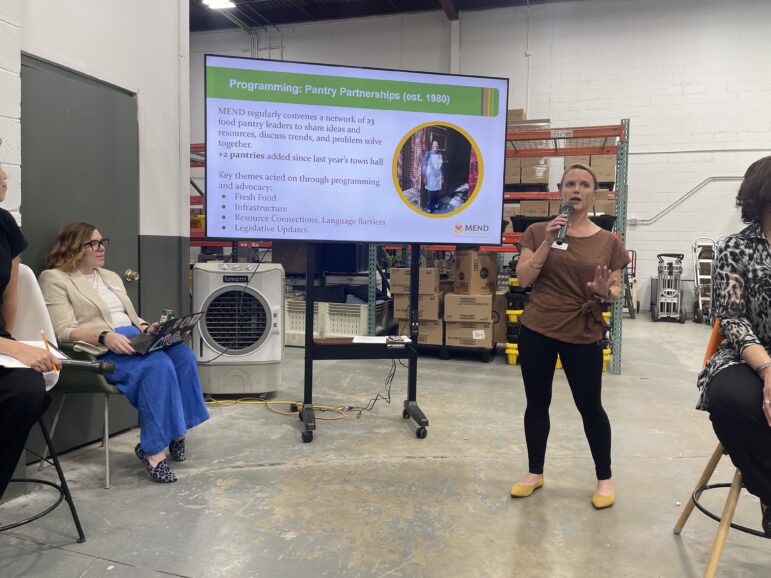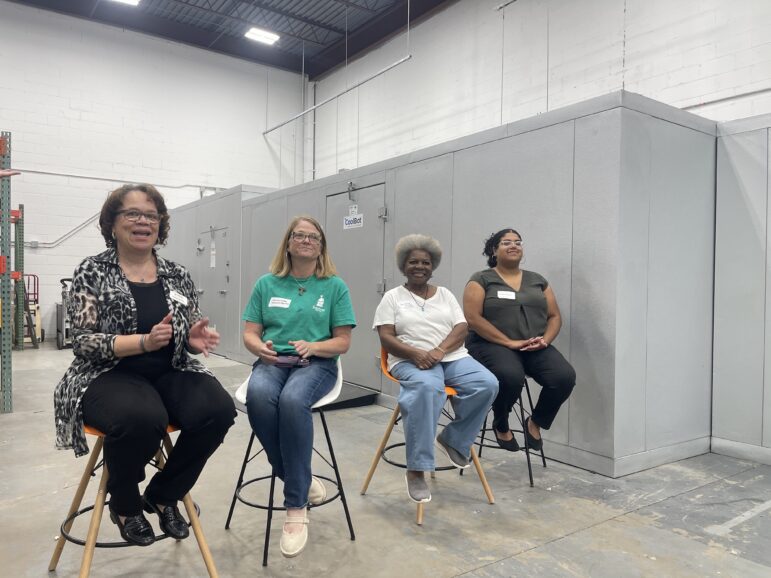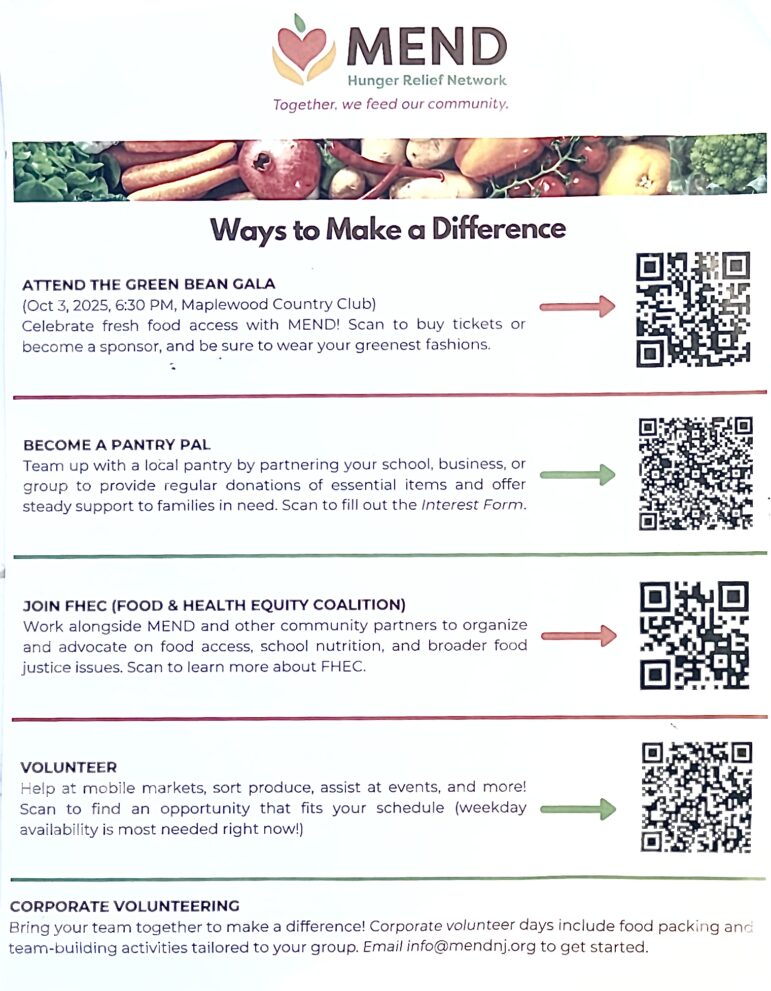With looming cuts in federal aid plus rising inflation and a stagnant job market, local food pantry managers are finding that demand for their services are growing — just as resources are shrinking.
“Our lines are getting longer,” said MEND Executive Director Robin Peacock at the annual MEND Food Relief Network Town Hall on September 16 at MEND’s Fresh Food Hub in Orange.
MEND supplies food to 23 food pantries throughout Essex County. In 2024, the MEND reported that it provided supplemental food to 490,000+ people, and 90% of that food was fresh.

Robin Peacock, Darlyn Blaney, Melissa Hillier, Sandra Jackson and Dalili Gonzalez.
Peacock shared that, starting October 1, MEND will lose $150,000 in federal Local Food Purchase Assistance (LFPA) funds — funding that has supported fresh food deliveries to homebound seniors, families with young children, and people with disabilities.
That funding loss will be exacerbated by looming cuts to SNAP, the Supplemental Nutrition Assistance Program, as well as Medicaid and housing programs — “changes that could push even more families to seek food assistance,” said Peacock.
“The mission of MEND is to strengthen the health of our community by increasing fresh food access,” added Peacock, explaining that MEND goes beyond the shelf-stable foods that predominate at pantries to supply fresh produce, which is “like gold” to clients.
Darlyn Blaney, a MEND board member and Roseville Presbyterian Church pantry manager in Newark, echoed Peacock’s point about lines getting longer: “I get there about 8:30 in the morning and the folks are already lined up. The concern is they don’t want us to run out of the food they need.”
Sandra Jackson, pantry manager at Elmwood United Presbyterian Church in East Orange, concurred, saying the lines are already long when she gets to work at 7:30 a.m. Jackson noted that she was also seeing new clients in her line, including nurses in scrubs and “people with PhDs.”

Keily Hayes
Beyond the lengthening lines, MEND and the pantries it supports are finding they need to increasingly provide other assistance.
“Our model is very much to listen and then work collaboratively to respond,” said Peacock, noting that the organization is answering increased requests around housing insecurity and is providing more and more supplies such as diapers.
“A big difference in the past two and half years is the number of families we’re serving. When I started our diaper program in 2018 we were giving out about 30 packs of diapers a week. Just this past week, we’re up to 157 packs of diapers,” said Melissa Hillier, the Franciscan Charities pantry manager in Newark.
“Whatever our clients need, we try to address all their needs,” said Keily Hayes, MEND’s Director of Community Impact.
Said Hillier, “Hunger is just the beginning of the story.”

Managers did discuss the fear that has taken hold in the immigrant community due to U.S. Immigration and Customs Enforcement activity and said they were working to allay clients’ fears and provide services. Blaney reported that people did continue to come to her pantry for assistance, saying that, ultimately, “the need for food outweighs the fear.”
Dalili Gonzalez, MEND’s Community Resource Specialist, reported that she is spending much of her time helping clients navigate changes to SNAP.
According to the nonpartisan Center for Budget and Policy Priorities, “some low-income families will see their food assistance terminated or cut substantially (or will be denied benefits) this fall,” due to the passage of the One Big Beautiful Bill Act, and “most current participants will face cuts when their SNAP eligibility is next recertified. States recertify eligibility for most SNAP households every six or 12 months.”
Gonzalez said that some clients are also concerned about sharing their information in order to obtain benefits.
Dignity is a word that came up again and again. [MEND stands for Meeting Essential Needs with Dignity.] Hillier talked of how providing fresh produce and eggs allows families to cook their own food, maintaining cultural traditions and bringing families together.
Christine Yoon, MEND’s director of Operations, told the story of a client who became a volunteer. “We’re building community. I really see that happening.”
When asked what made her feel positive in these challenging times, Blaney answered, “MEND gives me hope. We’re not in this alone.”
How to help
MEND is always looking for contributions — both monetary and through volunteerism.
MEND’s largest fundraising event, the Green Bean Gala, is taking place this year on October 3, at the Maplewood Country Club. Buy tickets here. Find information on how to volunteer or host a food drive or a fundraiser here.


